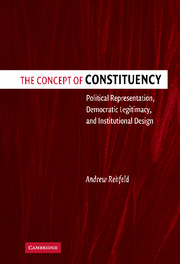"In the current climate of complete and utter confusion, even despair, concerning the direction of redistricting practices, Rehfeld's project is important, laudable, and most welcome. His book is a much-needed attempt to develop a stock of concepts and a vocabulary sufficient to permit reasoned argument and justification in subdividing an electorate into constituencies, and he shows us both by argument and by example how to demand sound justifications for any use of territory as the basis for election districts... The book is written with exceptional clarity, engagingly advances a rich argument, and performs a valuable service by challenging us to pay careful attention to positions and arguments that, as Rehfeld persuasively shows, have not been subjected to adequate scrutiny."
James A. Gardner, Election Law Journal
“The Concept of Constituency is a thought-provoking and insightful book that is a must read for anyone interested in political representation, democratic legitimacy and institutional design.”
–Suzanne Dovi, University of Arizona, Perspectives on Politics
“Andrew Rehfeld’s pathbreaking book should change the way we think about the most basic mechanisms of modern liberal democracy…This is a revolutionary book in democratic theory.”
-Charles Larmore, University of Chicago “Rehfeld demonstrates an impressive command of a wide range of materials, drawing on and discussing relevant literature from diverse fields…The Concept of Constituency should be read by students of political science, political theory, law, and others with an interest in representation and redistricting.”
-Stephen Macedo, Princeton University
“Important and highly original…This book is a path breaking step forward in democratic theory: his theorizing of constituency and powerful critique of the limits of territory point the way for those new acts of imagination now required of democrats who would respond to global issues.”
-Mark Warren, University of British Columbia Ethics“Andrew Rehfeld’s provocative new book, The Concept of Constituency, arrives at an ideal time…Rehfeld’s combination of carefully researched history and rigorous logic illuminates the choice we must make between maintaining single-member districts and moving to an American form of full, proportional representation.”
-Rob Richie, FairVote –The Center for Voting and Democracy“Making us self-conscious about constituency definition, and asserting that territorial representation no longer meets the needs it once supposedly served, Rehfeld proposes randomized national groupings…Whether or not one agrees, this book challenges us to rethink why and how we choose legislators.”
-Nancy L. Schwartz, Weslyan University
“…Democratic theorists can no longer justifiably ignore the problem of constituency definition. Whatever other effects it may have, Rehfeld’s book has accomplished this much.”
-Peter Stone, Standford University Polity“The Concept of Constituency argues for a fundamental rethinking of the relationship between constituents and politicians. This is a creative and original argument that deserves serious discussion.”
-David Canon, University of Wisconsin-Madison, Polity“The Concept of Constituency is a path breaking book that should attract widespread attention among scholars working in normative political theory.”
-Michael Rabinder James, Bucknell University, Polity
“Rehfeld challenges us to think creatively about institutional designs capable of orienting politics more toward the interests we have in common than toward those that divide us. In a world of fast-increasing economic inequality and looming environmental crisis, what could be a more salutary agenda for political theory?”
-Melissa Williams, Univerisity of Toronto Polity
“Insightful and important…succeeds in opening up a new and important area of inquiry… The Concept of Constituency is a thought-provoking and insightful book that is a must read for anyone interested in political representation, democratic legitimacy, and institutional design.”
–Suzanne Dovi, University of Arizona APSA’s Perspectives on Politics
“Convincing and well argued…Rehfeld's book represents a rare bread of academic discussion that is prepared to challenge the apparent orthodoxy of a given discussion by raising the sorts of questions that many people simply overlook”
-Matt McCullock, Loughborough University H-Net“In the current climate of complete and utter confusion, even despair, concerning the direction of redistricting practices, Rehfeld’s project is important, laudable and most welcome…The book is written with exceptional clarity, engagingly advances a rich argument, and performs a valuable service by challenging us to pay careful attention to positions and arguments that, as Rehfeld persuasively shows, have not been subjected to adequate scrutiny.”
James A. Gardner, University of Buffalo Election Law Journal



